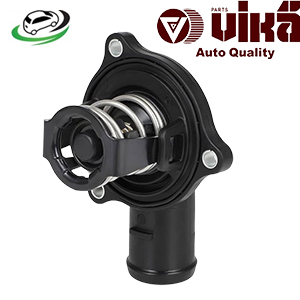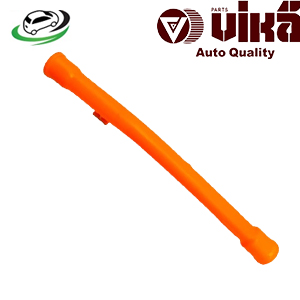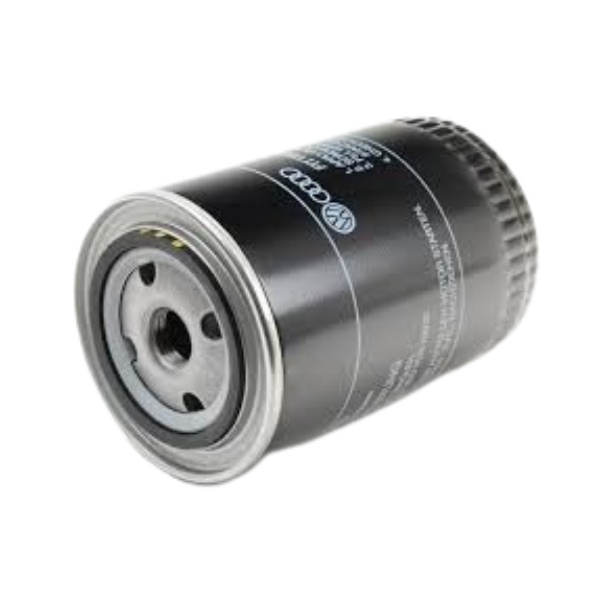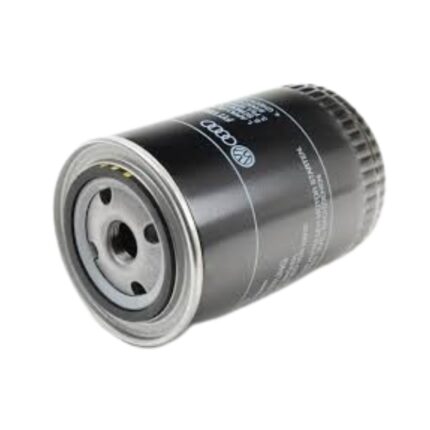Get AUDI B5 A4 Oil Filter Assy 068115561B in Kenya
The oil filter is a cylindrical or cartridge-like device that traps and removes impurities from the engine oil. As engine oil circulates through the engine, it picks up debris, metal shavings, and combustion byproducts. If left unfiltered, these particles can cause increased wear on engine components, reduce efficiency, and eventually lead to engine damage.
Oil filters are generally located near the engine block, and they work by allowing oil to flow through a porous filtering material that catches contaminants while allowing clean oil to pass through.
2. Function of an Oil Filter
The primary function of an oil filter is to ensure that the oil circulating in the engine is free from contaminants, thus providing clean lubrication for the engine’s moving parts. The oil filter helps achieve the following:
1. Remove Contaminants
- Engine oil naturally accumulates impurities over time, including dust, dirt, carbon particles, and metal shavings from engine wear. The oil filter traps these contaminants to prevent them from circulating back into the engine.
2. Promote Smooth Engine Operation
- By filtering out contaminants, the oil filter ensures that the engine’s moving parts are properly lubricated, minimizing friction and wear. Clean oil allows for smoother operation, improved fuel efficiency, and extended engine life.
3. Maintain Oil Pressure
- The oil filter helps maintain the engine’s oil pressure by ensuring that oil flows freely through the engine. A clogged or damaged filter can restrict oil flow, causing a drop in oil pressure, which can lead to engine overheating and wear.
4. Prevent Engine Damage
- Without an effective oil filter, contaminants can accumulate in the engine and lead to increased wear and tear on engine parts, such as bearings, camshafts, and pistons. Over time, this can cause engine failure, expensive repairs, or even complete engine replacement.
3. Types of Oil Filters
There are several different types of oil filters available, each designed for specific engine configurations and operating conditions. Understanding these types helps in choosing the right filter for a particular vehicle.
1. Full-Flow Oil Filters (Primary Oil Filters)
- Description: Full-flow oil filters are the most common type used in modern vehicles. They filter all of the oil that passes through the engine, ensuring that the oil remains clean at all times. These filters are designed to handle the full flow of oil, so they must allow oil to pass through them easily without restricting flow.
- Pros: Filters all of the engine oil, ensuring maximum protection.
- Cons: May not capture smaller particles as effectively as other types of filters.
2. Bypass Oil Filters (Secondary Oil Filters)
- Description: Bypass oil filters only filter a small portion of the engine oil at any given time. They are designed to remove smaller contaminants that full-flow filters may miss. Bypass filters are often used in heavy-duty or high-performance applications where additional filtration is necessary.
- Pros: Filters smaller particles more effectively than full-flow filters.
- Cons: Only filters part of the oil flow, so larger particles may remain unfiltered.
3. Cartridge Oil Filters
- Description: Cartridge oil filters are designed to be replaced by simply removing the filter element, without changing the outer casing. These filters are often environmentally friendly since they generate less waste than traditional spin-on filters.
- Pros: Environmentally friendly, easy to replace.
- Cons: May be less convenient to install or remove compared to spin-on filters.
4. Spin-On Oil Filters
- Description: Spin-on oil filters are the most widely used type of oil filter. They consist of a filter element enclosed in a metal canister with a threaded base, which allows them to be screwed directly onto the engine. Spin-on filters are known for their ease of installation and replacement.
- Pros: Easy to install and replace.
- Cons: Generates more waste due to the metal canister being discarded after use.
5. Magnetic Oil Filters
- Description: Magnetic oil filters use a magnet or magnetic element to attract and capture metal particles from the engine oil. These filters are often used in high-performance or heavy-duty applications where engine wear produces more metallic debris.
- Pros: Excellent at removing metallic contaminants.
- Cons: Less effective at filtering non-metallic particles such as dirt or dust.
6. Thermal Chamber Oil Filters
- Description: These filters incorporate a heating element that heats the oil to improve its flow during cold starts. The heating process also helps to evaporate moisture and other contaminants from the oil.
- Pros: Helps prevent oil thickening in cold conditions, reduces moisture in the oil.
- Cons: More complex and expensive compared to standard filters.
4. Symptoms of a Failing Oil Filter
A failing oil filter can cause a range of issues that, if left unchecked, can lead to engine damage. Some common signs that the oil filter may need replacement include:
1. Oil Pressure Drop
- A clogged oil filter can restrict the flow of oil, leading to a drop in oil pressure. This can trigger a warning light on the dashboard and, if not addressed, can cause severe engine damage.
2. Engine Overheating
- Insufficient oil flow due to a clogged or damaged oil filter can result in inadequate lubrication, causing the engine to overheat. Overheating can damage critical engine components, such as the pistons and cylinder walls.
3. Engine Noise
- A failing oil filter can cause the engine to run noisily due to insufficient lubrication. Increased friction between engine components can create loud knocking or grinding noises, which may indicate that the oil is not circulating properly.
4. Dirty Exhaust
- A clogged oil filter can result in unburned oil entering the combustion chamber, leading to dark, smoky exhaust. This can be a sign of poor oil filtration and should be addressed immediately.
5. Metallic Noise
- A failing oil filter can allow metal particles to circulate through the engine. If you hear a metallic scraping or grinding noise, it may be due to these contaminants, which can cause excessive wear on engine components.
5. Benefits of Regular Oil Filter Maintenance
Regular oil filter maintenance offers numerous benefits that enhance engine performance and extend the life of your vehicle. These benefits include:
1. Improved Engine Performance
- Regularly changing the oil filter ensures that the engine operates smoothly and efficiently, providing optimal performance.
2. Longer Engine Life
- By keeping the engine oil clean and free from contaminants, a well-maintained oil filter reduces wear on engine components and prolongs the engine’s lifespan.
3. Enhanced Fuel Efficiency
- Clean oil allows the engine to run more smoothly, reducing friction and improving fuel efficiency.
4. Reduced Emissions
- A properly functioning oil filter helps reduce harmful emissions by ensuring that the oil burning inside the engine is clean, leading to more efficient combustion.
5. Lower Repair Costs
- Regular oil filter maintenance prevents contaminants from damaging engine components, which can lead to costly repairs if left unaddressed.
6. Oil Filter Maintenance Tips
Maintaining your oil filter is a simple yet crucial aspect of vehicle care. Here are some tips to ensure your oil filter remains in top condition:
1. Change the Oil Filter with Every Oil Change
- It is recommended to replace the oil filter every time the engine oil is changed. This ensures that both the oil and the filter are clean and working effectively. Most manufacturers recommend changing the oil filter every 3,000 to 7,500 miles, depending on the vehicle and driving conditions.
2. Use the Right Filter
- Always use the oil filter specified by your vehicle’s manufacturer. Different engines require different types of filters, and using the wrong one can lead to inadequate filtration and potential engine damage.
3. Inspect for Leaks
- After changing the oil filter, check for any oil leaks around the filter housing. A properly installed filter should form a tight seal, preventing oil from leaking.
4. Monitor Oil Pressure
- Keep an eye on the oil pressure gauge or warning light on your dashboard. If you notice a drop in oil pressure after changing the oil filter, it could indicate a problem with the filter or the installation.
5. Choose Quality Filters
- When replacing your oil filter, invest in a high-quality filter from a reputable manufacturer. Cheap or low-quality filters may not provide adequate filtration and could fail prematurely.
7. How to Replace an Oil Filter
Replacing an oil filter is a relatively simple task that can be done with basic tools. Here is a step-by-step guide to replacing an oil filter:
1. Drain the Oil
- Start by draining the old engine oil from the oil pan. Place a container under the drain plug and remove it to allow the oil to flow out.
2. Remove the Old Oil Filter
- Using an oil filter wrench, unscrew the old oil filter from its housing. Be prepared for some oil to spill out, so have a container or rag ready.
3. Prepare the New Oil Filter
- Before installing the new filter, apply a small amount of clean engine oil to the rubber gasket on the top of the filter. This helps create a tight seal and makes it easier to remove the filter during the next oil change.
4. Install the New Oil Filter
- Screw the new oil filter onto the engine by hand. Once it is snug, use the oil filter wrench to tighten it further, but avoid over-tightening, as this can damage the gasket.
5. Add New Engine Oil
- After replacing the filter, refill the engine with the recommended amount of new oil. Check the oil level with the dipstick to ensure it is within the proper range.
6. Check for Leaks
- Start the engine and let it run for a few minutes. Check around the oil filter and drain plug for any signs of leaks. If everything is secure, you’re done!
Conclusion
The oil filter is an essential component of any vehicle’s engine, playing a key role in keeping the engine oil clean and ensuring the smooth operation of the engine. Regular maintenance, such as timely filter replacement and the use of high-quality filters, can prevent engine damage, improve fuel efficiency, and extend the lifespan of the vehicle. Understanding how the oil filter works, recognizing signs of failure, and practicing proper maintenance will help you maintain your vehicle’s performance and reliability.
Follow us on Facebook for more parts.





Reviews
Clear filtersThere are no reviews yet.